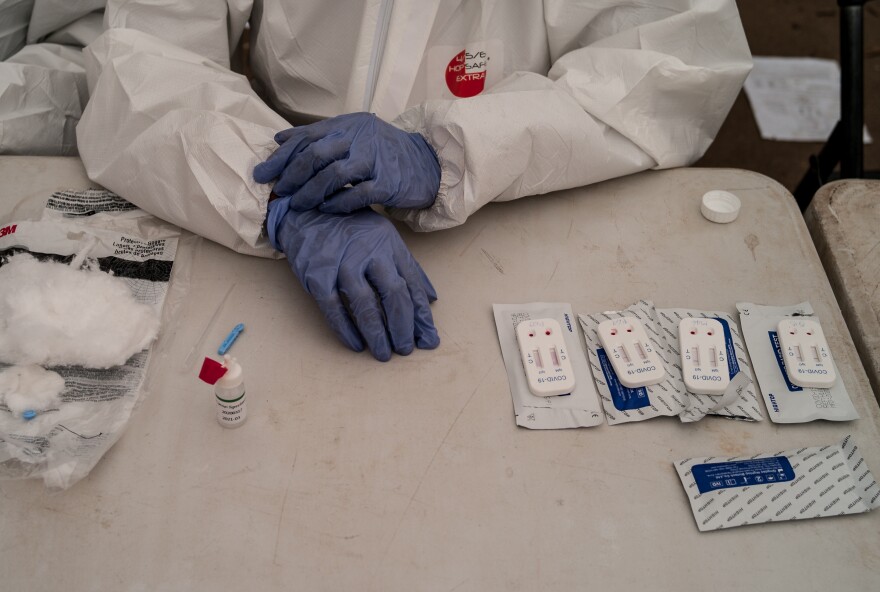When Dr. Kathleen Page made her hospital rounds in the early stages of the coronavirus pandemic, she heard the same question from Latino immigrants hospitalized with COVID-19 over and over again: “When can I go back to work?”
“The clear underlying theme here was low income wages, the necessity to work,” Page said, especially for undocumented immigrants. “Remember: They were not getting the stimulus check, they were not getting unemployment benefits.”
Latinos make up 6% of Baltimore’s population, but account for 15% of the city’s current COVID-19 cases. Their large makeup of the city’s essential workforce likely has something to do with that figure, Page said.
A new city program called COVID-19: Prevención, Control y Respaldo — which translates to COVID-19: Prevention, Control, and Support — aims to bring that number down by partnering with trusted Latino and immigrant advocacy groups in delivering targeted education, testing and financial relief.
Trust is one of the most crucial factors in positive health outcomes for Latinos, Page, an expert on how infectious diseases affect Latinos, said. President Trump’s rhetoric about their community, coupled with conspiracy theories about the virus on social media, have eroded their trust in the government, she said.
And when undocumented immigrants are worried about their immigration status, and well as excluded from the CARES Act and Medicaid, their anxiety is tenfold.
“Contact tracing is a huge part of trying to control this epidemic,” Page said. “But you can imagine that someone who has been surviving by trying to stay under the radar, when they get these calls asking all sorts of pretty specific and personal questions, there will be mistrust.”
That’s why the partnership with trusted advocacy groups is so crucial, said Catalina Rodriguez Lima, the director of the Mayor’s Office of Immigrant Affairs.
“We rely on other non-profit organizations to bridge the gap between city agencies and immigrant communities who may be fearful of applying or accessing resources,” Rodriguez Lima said.
The program encompasses strategies as simple as providing virus education in Spanish to hiring members of the community to assist in that outreach. The city will partner with the advocacy group CASA on those efforts, and partner with the Esperanza Center to hire and train linguistically and culturally competent contact tracers.
Those contact tracers will also connect residents who test positive for COVID-19 with limited access to public benefits to resource navigators, who will in turn provide one-time cash relief from Emergency Relief for Immigrant Families (ERIF) fund. Families will get $800, while individuals will get $400.
That cash assistance can shrink financial pressure and health risks, both for the households that receive them and those around them, like extended family or co-workers, Rodriguez Lima said.
“Being able to stay home and not have to worry about feeding your family or your children, I think brings a lot of relief to these families who are already struggling and who are struggling prior to the pandemic,” she said.
The recipients’ resource navigators will also connect them to benefits such as SNAP, eviction prevention and utility assistance.
Mayor Brandon Scott called the program a part of his new administration’s commitment to equity.
“I’ll be focused on ensuring economic and health resources are inclusive of immigrant communities, regardless of language, immigration status or the ability to access technology,” the Democrat said at a Friday news conference.
Lydia Walther-Rodriguez, CASA’s regional director, said the organization’s track record of providing services regardless of immigration status allows them to reach city residents who are often left in the shadows.
“We were able to do that type of work because of the trust we've already built in the community -- for them to trust in us their addresses, trust in us that they would continue to be anonymous,” Walther-Rodriguez said.
Walther-Rodriguez is optimistic about the program. But what will really help the community she serves, she said, is action from the state or federal government.
“Folks are being threatened with eviction, being threatened with having their power shut off,” she said. “It's going to drive community members to expose themselves to go to work when they are symptomatic.”
The federal eviction moratorium is set to expire at the end of this month.
Walther-Rodriguez also said the state should also implement consequences for employers who are not providing proper PPE and who do not allow employees to take the time off when they are sick.





